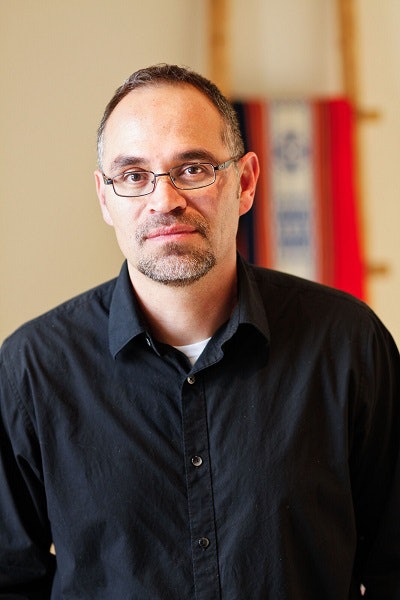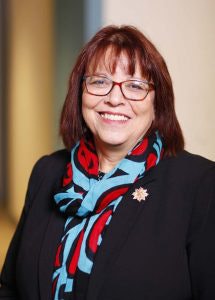Some alarming statistics speak to the need to bolster efforts to increase higher ed attainment among Native Americans.
College enrollment among Native Americans aged 18 to 24 fell from 41% in 2010 to 19% in 2016, according to the American Indian College Fund.
The College Fund, a charity that serves Native Americans, links the decline to the high school years, which don’t adequately prepare students for college, and to the low rate of Native American families who are college educated. Only 14% of Native American students in the United States who are 25 and older hold a bachelor’s or graduate degree.
 Dr. David Sanders
Dr. David SandersDr. David Sanders, vice president of research, evaluation and faculty development at the College Fund, suggests that college costs and the distance that students need to travel from home to some college campuses create significant challenges for many Native Americans who want to pursue higher education.
“When you’re from a rural community traveling pretty big distances to an institution, you might not have a car or you might not have a mode of transportation,” Sanders says. “It’s not just the cost around getting to the institution but also having access to technology that would allow you to participate in class, such as a computer. I think what we see is that there are some very basic issues that students have to overcome in order to be successful.”
It seems that attending tribal colleges and universities (TCUs) positively impacts outcomes for many Native American students. Based on the survey report, “Alumni of Tribal Colleges and Universities Better Their Communities,” Native American students who attend TCUs benefit significantly more from their college experience compared to peers who attend non-TCUs. E survey, a partnership between the Gallup organization and the College Fund, found that TCU attributes contribute to student success: They are “usually tribally controlled, typically located on Indian reservations or in other rural areas and are imbued with a mission to serve American Indian students with instruction that is more aligned with Native culture and values than what mainstream institutions offer.”
There are 37 TCUs in the United States. In fall 2017, 11% of Native American students attended a two- or four-year public or private, not-for-profit TCU, according to the report.
The report compared responses from 596 alumni of TCUs with 24,886 college graduates nationally, 2,889 minority-serving institution (MSI) graduates and 1,051 American Indian or Alaskan Native alumni. The TCU alumni represented nine institutions including Cankdeska Cikana Community College, Northwest Indian College, College of Menominee Nation, Diné College, Institute of American Indian Arts, Nueta Hidatsa Sahnish College, Sitting Bull College, Turtle Mountain Community College, and United Tribes Technical College.
“All of us who have worked with tribal colleges and universities since their founding in 1968 recognized that these place-based, culturally-rooted institutions transformed lives and communities,” said Cheryl Crazy Bull, president and CEO of the College Fund, in a statement. “rough the support of Strada Education Network and a partnership with Gallup, we are able to provide the data to back this up. Our graduates tell the story of our success as tribal institutions.” Sanders noted that TCUs offer a number of support systems, like smaller class sizes and a focus on building student and faculty relationships.
 Dr. Cheryl Crazy Bull
Dr. Cheryl Crazy BullAccording to the report, 53% of graduates surveyed strongly agreed they had a mentor who encouraged them to pursue their goals and dreams, compared to 28 percent of alumni nationally and 26 percent of MSI graduates. Additionally, 81% of TCU alumni strongly agreed they had at least one professor who made them eager to learn compared to 71 percent of college graduates nationally.
“There is definitely a dedication to serving the tribal community as well as students that come from a tribal community and that may or may not exist at other colleges and universities,” says Dina Horwedel, director of public education at the College Fund. Horwedel applauded TCU faculty for what they do to contribute to student and how these faculty members use education to improve communities.
Affordability also makes TCUs attractive picks for Native American students. A cost-effective college is what 67% of alumni said they enjoyed about their TCU experience. Compared to 56% of college graduates nationally and 60% from MSIs, 81% of TCU alumni were eligible for financial aid. However, only three percent of TCU alumni took out student loans between $20,001 and $40,000 to pay for college, compared to 19% of college graduates nationally, the report found.
The survey also noted that TCU alumni were more likely to feel prepared for their post-graduation life compared to the other groups surveyed. Once they graduate, the survey found, TCU graduates do well when they enter the workplace: 42% had higher rates of workplace engagement compared to 37% of college graduates nationally. Meaning, TCU alums are more intellectually and emotionally connected to their place of business. Also, TCU graduates are also active and engaged in their communities.
Among employed TCU graduates, four in 10 work for their tribe as a primary job. Additionally, 35% of employed alumni work for an “Indian-owned” business, an entity in which at least 50% of the property interests are owned by American Indians or Indian tribes, according to the survey. Additionally, 53% remain deeply interested in the work they are doing compared to 38% of college graduates nationally and 41% of MSI graduates, the research found.
Coupled with campus benefits, Sanders added, the proximity of TCUs to communities is an added benefit for students who want to earn a degree but not be far from home. “I think it’s just the nature of the community, it’s close-knit,” says Sanders. “The institution itself is within the community so a lot of the students who attend the tribal colleges are from the communities, so they have some built-in support networks available to the students. It’s also an easy-in back into the community once they complete their degree, so they are pretty well grounded in the issues and support mechanisms there within the community.”
Now that the findings on TCUs are in, Horwedel says it’s time to share them not only with those in the education community, but the findings will be part of an outreach and awareness campaign that is expected to target the general population and elected officials.
Sanders says the report and survey findings are unprecedented, providing evidence of the value and impact of TCUs. But Sanders is eager to take a more expansive look at TCUs in the next three years. In the meantime, he said the College Fund will work on research that examines college cost and affordability.















